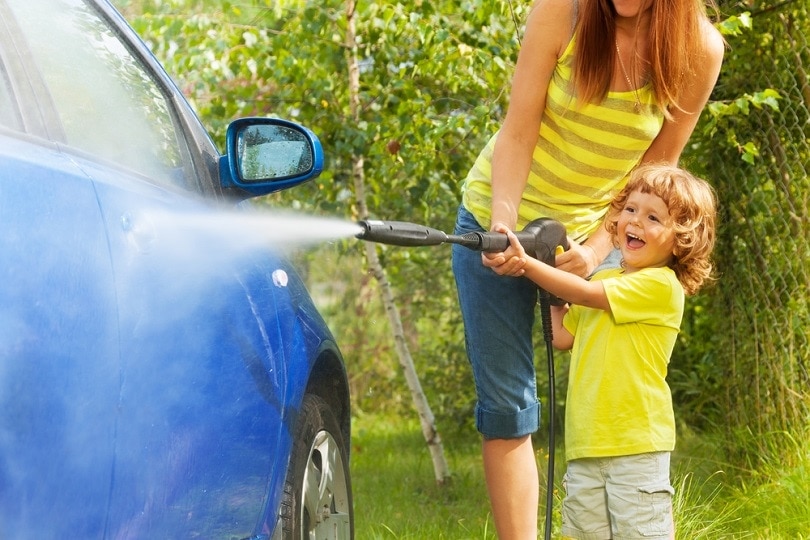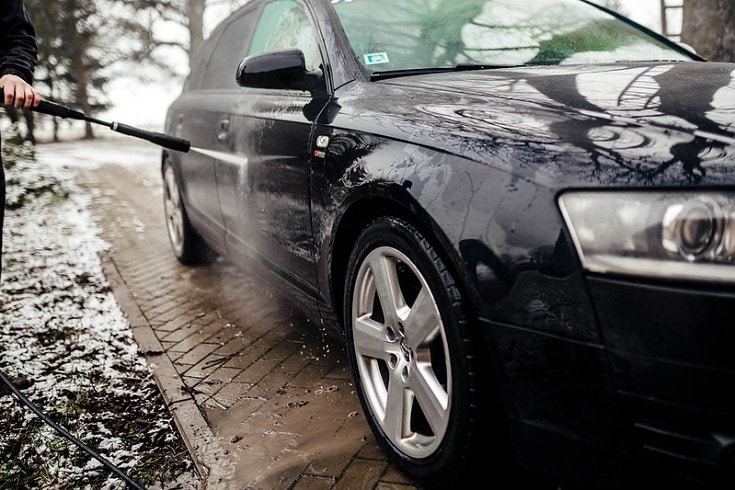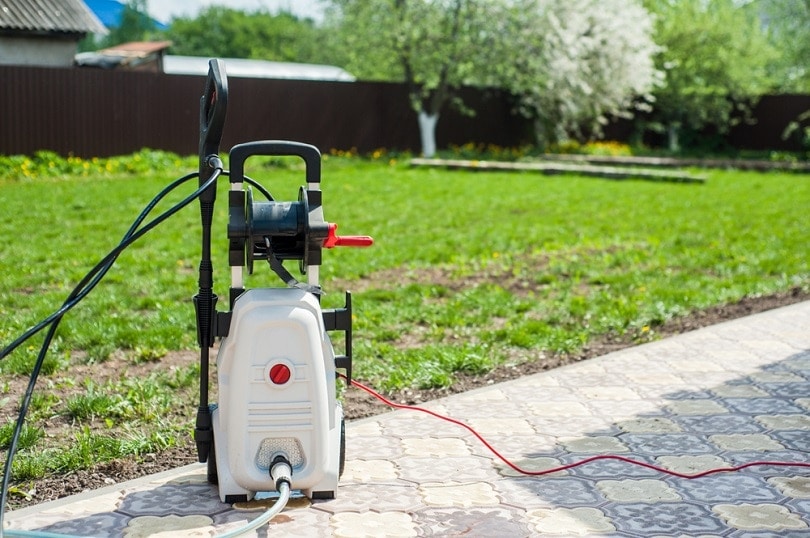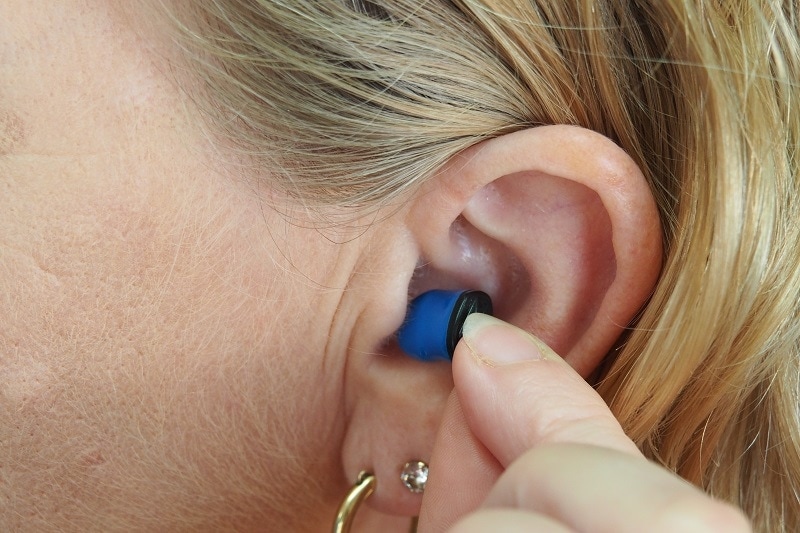How Loud are Pressure Washers Compared to Other Tools?
-
Pete Ortiz
- Last updated:

Firing up any noisy tool in a quiet neighborhood can feel intrusive and awkward. The relative silence of the surrounding area seems to magnify the sound of your tool. This is true even if you’re just hammering a few nails. But if you’re operating a loud machine, you might really feel the spotlight on your back.
Despite this, you’ve got things to accomplish, and the deck isn’t going to wash itself. So, how much is it going to bother your neighbors for you to run that pressure washer? Is it quiet enough to use in the morning or evening? How loud is it compared to other tools?
You might be surprised to find out that pressure washers are not always much of a disturbance. Really, it depends on the type of pressure washer you’re using. Before we talk about specific decibel levels that these machines reach, let’s take a closer look at the different types of pressure washers.
Electric Versus Gas-Powered Pressure Washers

There are two main types of pressure washers; electric and gas-powered. Electric pressure washers have to be plugged into an outlet while gas pressure washers run on gasoline. But the differences between these two machines go much deeper than their power sources.
Electric pressure washers generally produce less than 2,000 PSI. They’re compact, lightweight, and don’t require any maintenance. These tools are perfect for smaller jobs around the house but lack the pressure to do heavy-duty cleaning tasks.
Gas-powered pressure washers are an entirely different story. These beasts are big, loud, and loaded with power. They often produce pressures in excess of 3,000 PSI, making them perfect for industrial cleaning jobs. Compared to electric pressure washers, gas-powered models are far more expensive and require regular maintenance and upkeep.
How Loud are Pressure Washers?
When we’re comparing the volume that pressure washers make during use, we can’t lump them all together. Gas-powered pressure washers are so different from electric models that they’re not truly the same tools from an operating standpoint. So, we have to look at each individually to see how loud they are on average.
Electric Pressure Washers
Topping out at about 2,000 PSI, electric pressure washers aren’t the most powerful option, though they’re still adequate for most cleaning tasks around the home. Because they’re electric, the motor doesn’t have to run all the time as it does on a gas-powered machine.
In essence, an electric pressure washer is only “on” when you pull the trigger. When you let go of the trigger, the machine shuts off. This means that electric pressure washers only make noise while you’re actually spraying water; they’re completely silent the rest of the time.
On top of this, the electric motor in one of these pressure washers is much quieter than a gas-powered engine. Most electric pressure washers are about 78-80 decibels while they’re in use. This makes them only slightly louder than your average vacuum, but much quieter than a table saw or an electric drill.

Gas Pressure Washers
Most electric pressure washers are pretty similar. That’s not the case with gas pressure washers. These range drastically in power, size, and operating volume. It’s not always the least powerful that makes the least noise though. It mostly comes down to the technology that was used in any particular gas pressure washer.
The quietest gas pressure washers produce 85 decibels while they’re running. But remember, it’s running the whole time. When you let go of the trigger, the engine keeps running and making noise, unlike an electric pressure washer.
Louder models can reach 100 decibels during use, making them louder than many standard power tools, like table saws, electric drills, orbital sanders, and belt sanders. However, the quietest models that operate at 85 decibels are quieter than a kitchen blender, and just about the same volume as an idling motorcycle.
| Decibels | |
| 10 | Pin Drop |
| 30 | Whisper |
| 60 | Normal Conversation |
| 70 | Office Noise, Interior of a car at 60 mph |
| 75 | Average Vacuum Cleaner |
| 78-80 | Electric Pressure Washer |
| 85 | Start Wearing Hearing Protection |
| 85-100 | Gas Pressure Washer |
| 85-90 | Idling Motorcycle |
| 88 | Kitchen Blender |
| 90 | Orbital Sander |
| 90-93 | Table Saw |
| 94 | Belt Sander, Planer |
| 99 | Electric Drill |
| 102 | Tile Saw |
| 103 | Miter Saw |
| 110 | Chainsaw |
| 115 | Hammer Drill |
| 140 | .22 caliber rifle |
| 150+ | Permanent Hearing Damage |
| 150 | Jet taking off from 25 meters |
| 150-175 | 12-Gauge Shotgun + Large Bore Rifles |
Protecting Your Hearing

Depending on the pressure washer you’re using, you may or may not benefit from wearing some hearing protection. It’s something we often overlook, but when dealing with loud tools, it could be the thing that saves your hearing. If you only occasionally use loud tools, then it might not be such a big deal. But if you regularly use power tools without hearing protection, you could be putting yourself at risk for permanent hearing damage.
When dealing with prolonged noise, it’s recommended that you start wearing hearing protection at about 85 decibels. With long bouts of 85+ decibel noise, you’re risking permanent hearing damage. Luckily, electric pressure washers are generally quieter than this. However, all gas-powered pressure washers are at least 85 decibels when operating. So, you should always wear hearing protection when using a gas pressure washer.
Common tools like sanders, saws, and drills all operate well above the 85-decibel threshold. In fact, many of these tools are louder than 100 decibels, including tile saws, chainsaws, miter saws, and hammer drills.
Thankfully, all of these tools are far from creating enough noise to permanently damage your hearing with a short exposure time. But at 150 decibels, even a short exposure with no hearing protection could cause permanent damage. 150 decibels is about how loud a round from a 12-gauge shotgun is, or the volume of a jet taking off from a distance of 25 meters.
Conclusion
Compared to most power tools, pressure washers are pretty quiet. Electric pressure washers are hardly louder than a standard vacuum cleaner, averaging just 78-80 decibels while operating. Gas pressure washers are much louder, though the quietest models are still quieter than electric drills, table saws, and even kitchen blenders, at a mere 85 decibels. Louder models make more noise than any of those tools though, topping out at more than 100 decibels. So, if you need a quiet pressure washer, go with an electric model. Or at the very least, be careful which gas model you pick!
You may also be interested in:
- 20 Brilliant Pressure Washer Uses You Didn’t Think About!
- How Loud Is a Sonic Boom In Decibels (dB)?
- How Loud Is a Cicada In Decibels (dB)?
Featured Image Credit: Sergey Novikov, Shutterstock
Contents



